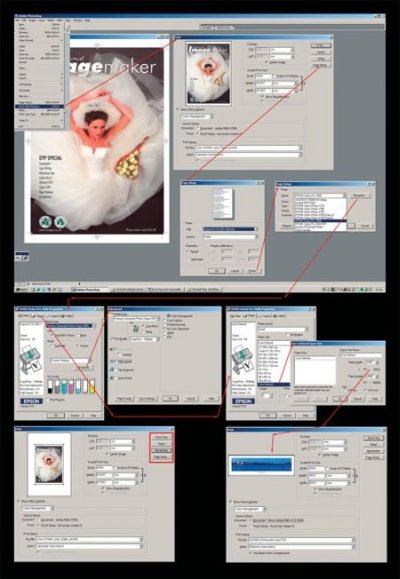articles/Digital/colouradjust7-page5
Colour Adjustment - Part 7 - part 5 of 1 2 3 4 5 6 7
by Mike McNamee Published 01/11/2003
Paper Matters
Paper has a profound influence on the outcome of the proofing process. The "colour" of paper is a complex subject and has specifiactions and ISO Standards all to itself (as do teeth and dentures by the way!).
The paper stock for Professional Imagemaker has a Brightness of 95% and a colour represented by 0.9, -2.3 on the Lab scale; that is blue towards magenta, which is typical of a stock with a moderate amount of optical brightening agent. Epson Premium Lustre has the same brightness but the colour is more blue at 0.2; - 4.0. Tetenal Duo print, a high OBA material has brightness that is actually 0.5% less but looks brighter because of the OBA. This also pushes its tone to a deeper blue at 3.5; - 8.0. Epson Dupont Commercial Matte proofing paper, a high premium material specifically designed for the job has a brightness of 95.8% and is slightly warm cream at 0.3; 3.0. Proofs on these papers are all affected by their base colour. The Epson Premium Lustre and Epson Dupont profile in more accurately and deliver more precision in the final output. The Tetenal produces a brighter print but is actually less accurate in absolute colour terms. These variations in profile accuracy are due to the distorions in the colour measurement influenced by the ultra violet component of the paper coating.
For Epson users, we can make the decision easy for you, use the Proofing paper Semi-Matte; in our tests to date it holds the record for most accurate delivered proof.

Follow the sequence. The dialogue boxes are very daunting at first. The screen grabs assembled alongside should help. You can make your own as you proceed through the set-up by Alt-Clicking the Print Screen button then pasting successive pane views into Word or a new Photoshop document. Tidy them up and print then out for future reference. The sequence flows to the pane marked 10. At this point you have to go back to the tab at #7 and click on paper if you require a special paper size or a size change. When everything is to your requirements you keep clicking Ok until you get back to the Print pane #11. Here, if you hold down the Alt key you may click the Remember Button (red lined in #11) and Photoshop will do just that for your settings.
Artists Proofs & Printers
Proofs It is arguable whether this topic should be included here. However for completeness, in the world of Fine Art and Limited Edition printing they have their own terms and meanings for proofs. A printer's proof is retained by the printing service provider, for reference when additional limited edition prints are called up, the so-called "print on demand". The printer's proofs may also include the prints made while the image is being adjusted to the satisfaction of the artist. The final proof (i.e. the one which is accepted as the final version) is called a BAT from the French bon a tirer or "good to pull or print". This proof can be an inkjet print, a giclee, Iris or Silk Screen. An artist's proof is one of a small number retained by the artist, which are not included in the count of the limited edition. Artists proofs are not normally sold but should the artist become very famous the cache of having something which is different can inflate the value of the proof - a bit like the pencil sketches of the revered and the famous really! Printers such as the Epson 4000, 7600 and 9600 will proof and create fine art output.
To RIP or Not To RIP?
We have been struggling for some time now to get to grips with some RIPs. Raster Image Processors have a number of advantages for proofing and for photographic printing. They are often hosted on a separate computer so that you simply move your files into a watched folder and let the RIP get on with things while you work un-hindered on your own machine. They also often come with the ability to "nest" the files to provide the best utilisation of paper. If the RIP is the same one as will create the films or Computer to Plate (CtP) units then you should be more secure with your output. Vendors like Ilford supply a turnkey Studio printing solution which includes, the RIP, PC, Printer, calibration and training. If you detect a note of doubt in the first sentence it is because to date we have achieved higher precision without a RIP than with, a subject we will come back to.
Please Note:
There is more than one page for this Article.
You are currently on page 5
- Colour Adjustment - Part 7 page 1
- Colour Adjustment - Part 7 page 2
- Colour Adjustment - Part 7 page 3
- Colour Adjustment - Part 7 page 4
- Colour Adjustment - Part 7 page 5
- Colour Adjustment - Part 7 page 6
- Colour Adjustment - Part 7 page 7
1st Published 01/11/2003
last update 09/12/2022 14:52:37
More Digital Articles
There are 0 days to get ready for The Society of Photographers Convention and Trade Show at The Novotel London West, Hammersmith ...
which starts on Wednesday 14th January 2026





